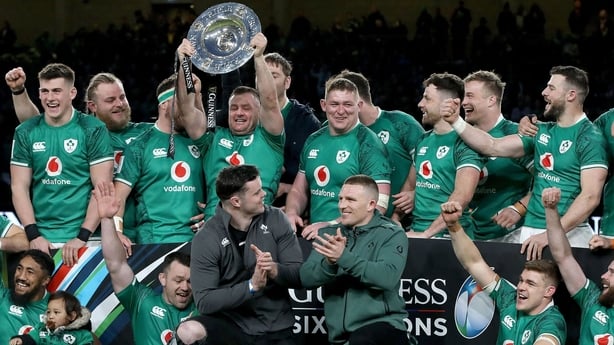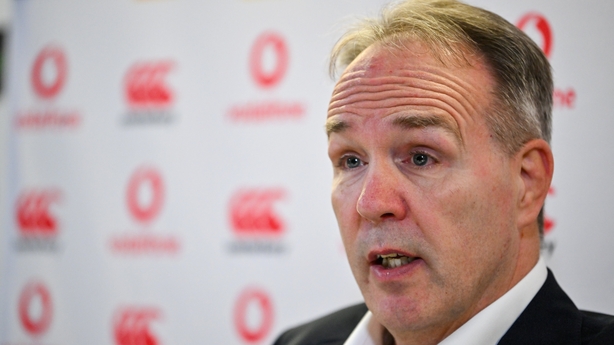The Irish Rugby Football Union have reported a profit of €5.9m for the 2021/22 season, but CEO Kevin Potts says he expects the governing body to deal with deficits in the coming years.
The figure of €5.9m is considerably better than the €4.9m loss they had budgeted for, in part due to the earlier than expected easing of Covid-19 restrictions, but largely because of the receipt of €18m in Covid assistance from the government.
Without that government assistance, of which €2.5m was distributed to clubs, the union would have been faced with an operating loss of €9m, having had to deal with combined losses of almost €47m during the two previous seasons that were impacted by the pandemic.
As well as government assistance, the IRFU were boosted by the CVC investment in the Six Nations, with the private equity firm acquiring 14% of the competition. The IRFU have benefitted to the tune of €44.6m from the deal, spread out across a number of years.
Income of €116m for the season is a €32m increase on the previous year's accounts, and although some of that is accounted for through the government funding, and CVC money, there was an €18m increase in income directly from the international game due to gate receipts and Ireland's second-place finish in the Six Nations. Meanwhile, professional game costs fell by €7.6m to €60.5m year-on-year.
The union's cash reserves of €66m is down considerably from close to €100m pre-Covid, with that figure made up of the pre-sale of 10-year tickets, and CVC's investment in both the URC and Six Nations.

And despite the union surviving the Covid-19 pandemic with a positive set of accounts this year, chief executive Potts says they are budgeting for a deficit across each of the next three seasons.
"The key for us in Irish rugby is we live within our means," Potts said at a briefing at the Aviva Stadium today.
"We are forecasting deficits over the coming three years, but that's on the expectation that after three years there should be an uplift in broadcast revenues in the next cycle from the Six Nations.
"If that doesn't happen, we'll have to look at our cost base again. We are clearly concerned, very aware of the economic situation, the energy crisis and the cost of living issues, and we're very aware of what's gone in in other jurisdictions with some of their clubs."
In 2021 the union made 20 non-playing staff redundant as they tried to cut costs during the pandemic, but the CEO says he doesn't believe more job losses will be needed, if their projections are correct.
"We will live within our means, ourselves and the four provinces, and that's the key to getting through any of these issues in the future.
"We're all fine at the moment, ourselves. The provinces, we're going through and have gone through a series of financial sessions with each. Irish rugby and the provinces, financially now, have stabilised and we have no concerns in the short team."
There have been concerns over the sustainability of the professional game following the financial chaos in the English Premiership, which has seen both Worcester Warriors and Wasps going into administration, resulting on dozens of players being released from their contracts, and now searching for short-term deals elsewhere.
A number of other English sides are reportedly feeling the financial strain, but Potts doesn't believe that will spill over into the Irish game.
"I don't really want to comment on the specific clubs, but it's really important for professional rugby that you operate with the funds you have with certainty.
"I don't believe it will have any impact here as long as, and I believe it's the case, the four provinces and ourselves operate our models on a sustainable basis.

And he says it's possible the difficulty in England may see player wages being reduced in the coming seasons.
"We have sympathy for all of the players coming out of contract or losing their jobs because of this but in a strange way it might have a deflating impact, perhaps, on player contracts in general," he added.
With the recently confirmed professional contracts for women's XV players, it sees the IRFU's investment in the women's programme rising by just over €2m per annum to €5.5m.
And Potts says with that €2m figure having not been budgeted for in previous seasons, the union will have to try find "external support", without which they may have to trim their budget around the union's other programmes.
"The new report which we will go through in a couple of weeks has a cost and that cost is not within our budget. We are already predicting deficits.
"We will make this happen, but ideally we would like some external support from sponsors or whomever. But we are certainly not going to hold back getting the journey started.
"It's balancing priorities. And just in terms of the men's national team; they generate something like 80% of our revenue and if we drop the investment there, and they become less competitive, well then that will have a knock-on effect on our revenues.
"But I am confident that the investment we need to put into the women’s game arising from the report will be found but we will need, and are seeking, external assistance."


